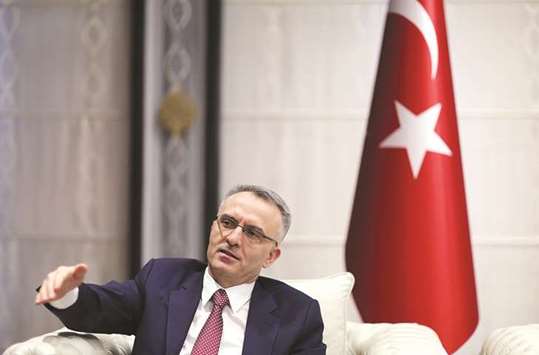Turkey’s finance minister defended his management of the nation’s budget, saying the widening of the deficit following last year’s coup is “manageable, sustainable and measured” and has boosted an economy that was headed for a slump last year.
“All of our economic indicators are extremely positive,” Finance Minister Naci Agbal said in an interview in Ankara on Friday. While the government’s medium-term programme foresaw a 1.6% budget gap, “in the position we’re in today, we predict it’ll be either just below or just above 2%,” Agbal said.
Fiscal prudence has been a key policy pillar of economic management under the now 15-year-long rule of President Recep Tayyip Erdogan’s AK Party, of which Agbal is a member. That stance has slipped since last year’s coup attempt as the government rolled out a series of tax breaks and lending incentives, a risk for a nation dependent on foreign capital because it runs one of the largest current-account deficits among major economies.
Agbal downplayed concerns over the deficit, saying the spending boost was undertaken intentionally in response to slowing growth following the coup attempt. “We give utmost importance to fiscal discipline,” he said.
The deficit in the first half of the year was 25.2bn liras ($7.1bn), compared with a surplus of 1.2bn liras in the same period of 2016. Analysts surveyed by Bloomberg see the deficit significantly higher than Agbal predicts, with the median estimate of 19 economists at 2.5% of GDP by year-end.
The budget balance was hit by the lowest collection rate on value-added taxes since at least 2006, according to official data. Of 80.9bn liras the finance ministry was owed, it collected less than a third that amount. Reform of the value-added tax system is one of the government’s priorities, Agbal said.
“One of the most common complaints I get is about VAT,” he said, citing the burden of filing paperwork monthly and saying that the current system sometimes made it cheaper to import intermediate goods than buy them locally. “There are requests that this system be simplified,” and a team from the finance ministry is studying how they system works in the UK.
“The VAT reform won’t in any way conclude with an increase in tax rates,” Agbal said, adding that the goal of revising the system isn’t to increase government revenue. “When we change the VAT system for all enterprises, at the same time it’ll bring growth rates up and support local production,” he said.

Naci Agbal, Turkey’s Finance Minister, speaks during an interview in Ankara (file). u201cAll of our economic indicators are extremely positive,u201d he said on Friday.
